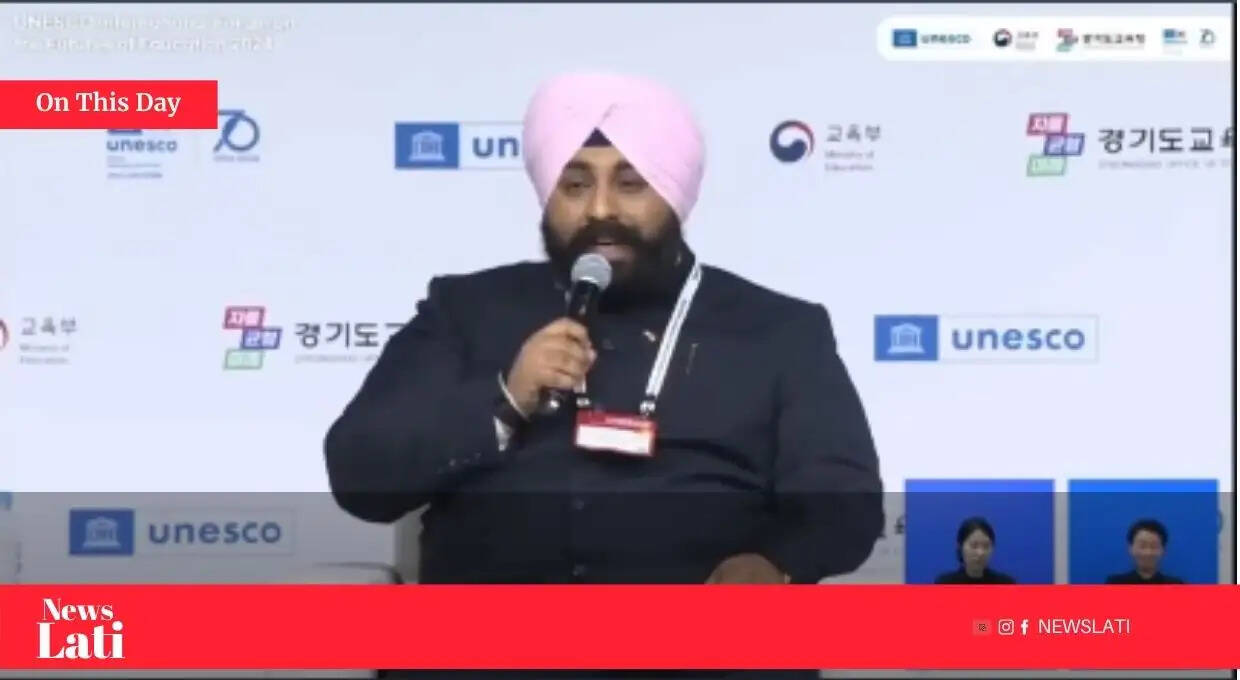Punjab's Education Minister Harjot Singh Bains Represents India at UNESCO Forum in Korea
Showcasing AAP's Education Revolution on the Global Stage

- Harjot Singh Bains, Punjab's Education Minister, represents India at the UNESCO Forum on the Futures of Education.
- Highlights AAP's innovative education model and Punjab's vision for transformative learning.
- The event underscores India's growing influence in global educational policy.
In a significant moment for India's educational landscape, Harjot Singh Bains, the Education Minister of Punjab, represented the nation at the UNESCO Forum on the Futures of Education held in Korea. This event, which gathered global educators, policymakers, and thought leaders, provided a platform for Bains to showcase the revolutionary education model implemented by the Aam Aadmi Party (AAP) in Punjab, marking a proud moment for India's educational reform efforts.
The UNESCO Forum, themed around envisioning the future of education, was an ideal stage for Bains to discuss the transformative initiatives undertaken in Punjab. Under the AAP's governance, Punjab has been at the forefront of educational innovation, focusing on inclusivity, technology integration, and quality enhancement in educational practices. Bains' participation was not just a representation of Punjab but also a reflection of India's commitment to educational advancement on a global scale.
"Education is the answer."
— Dr Ranjan (@AAPforNewIndia) December 3, 2024
Harjot Singh Bains proudly represented India, Punjab and Aam Aadmi Party in the UNESCO forum in Korea. pic.twitter.com/pNIxXmG7Qj
Bains, known for his proactive approach in the education sector, highlighted several key initiatives during his address:
-
Digital Integration: Punjab has been pushing towards digitizing education, ensuring that every student has access to digital resources, which is crucial in bridging the urban-rural educational divide.
-
Inclusive Education: The AAP government has been working towards making education accessible to all, including children with disabilities, through specialized programs and infrastructure.
-
Teacher Training: Recognizing teachers as the backbone of the education system, Punjab has invested in continuous professional development, aiming to elevate teaching standards across the state.
-
Infrastructure Development: New schools, particularly the School of Eminence in Ludhiana, were cited as examples of how infrastructure can transform learning environments, making them conducive to holistic development.
The forum's discussions revolved around how education systems worldwide could adapt to future challenges, including technological advancements, climate change, and social inclusivity. Bains' presentation was well-received, with many delegates expressing interest in Punjab's model, which combines traditional values with modern educational techniques.
This international recognition comes at a time when Punjab, under AAP's leadership, is undergoing what many are calling an "Education Revolution." The state's efforts in education have not gone unnoticed, with Bains' invitation to the UNESCO forum symbolizing a vote of confidence in India's educational reforms.
The participation of Bains in such a prestigious forum also underscores the AAP's broader political strategy, which emphasizes governance through direct impact on citizens' lives, particularly through education and health. This move not only positions AAP as a party with a vision beyond traditional political boundaries but also places Punjab on the map as a state leading educational reform in India.
Critics, however, might argue that while such international appearances boost morale and provide a platform for showcasing achievements, the real test lies in the sustained improvement in educational outcomes back home. The challenge for Bains and the AAP will be to translate these global accolades into tangible benefits for Punjab's students, ensuring that the education revolution is not just a slogan but a lived reality.
The UNESCO Forum's acknowledgment of Punjab's educational strides through Bains' representation marks a pivotal moment, not just for Punjab but for India's educational narrative on the global stage. It's a call to action for other states and countries to look towards innovative, inclusive, and technologically integrated education systems as the future of learning. As Punjab continues to refine its educational policies, the world watches, hopeful for a model that could inspire educational transformations globally.
